This post may contain affiliate sales links. Please read my disclosure policy.
Let’s talk about how to make a water bath for a cheesecake! They aren’t hard to set up and the extra step will give you a beautiful, creamy cheesecake free of cracks! Plus, I’ll share with you my tricks for no leaks!
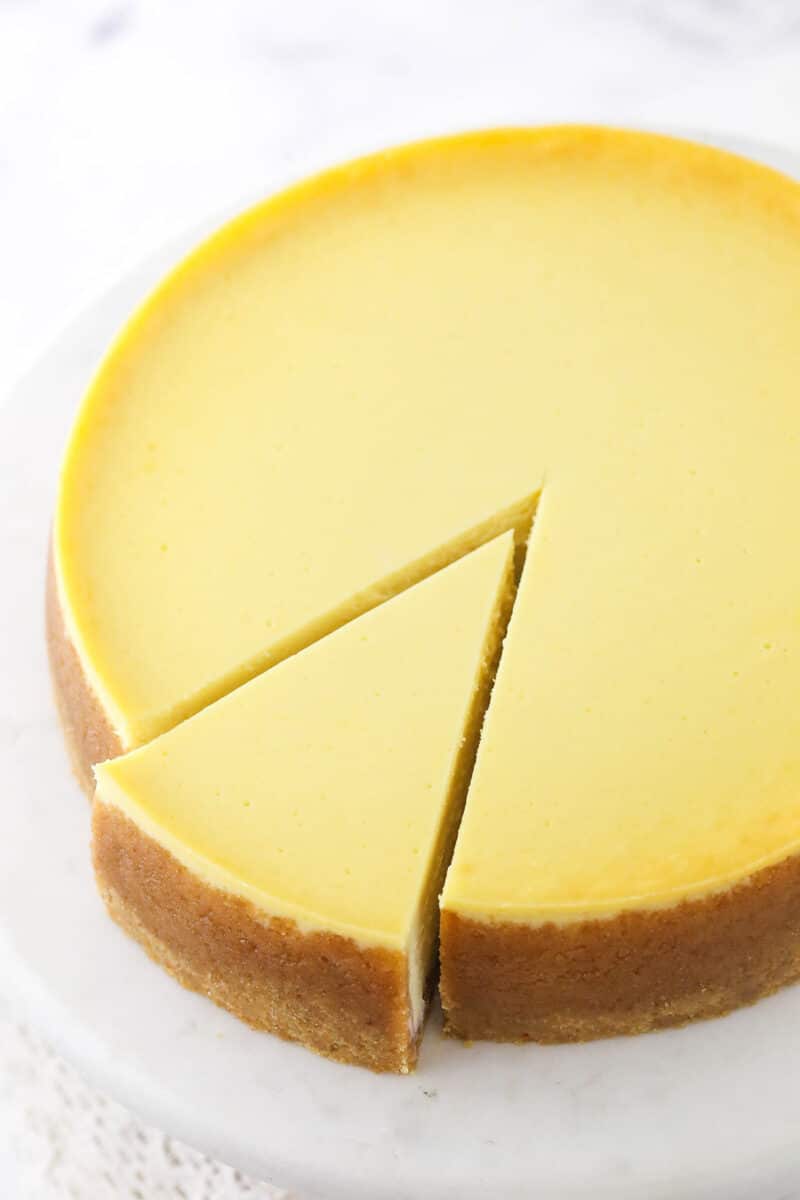
There’s no doubt that I’m a huge fan of cheesecake. The sheer number of cheesecake recipes on my site gives me away. I love the classics and I love unique twists. And with all the cheesecake baking I’ve done over the years, I’ve learned a lot and my number one tip for success is a water bath. If you want a beautiful cheesecake free of cracks, over-browned edges and a sunken middle, you need to use a water bath.
What is a Water Bath?
Cheesecake is basically a custard-based dessert and therefore needs to be treated differently. A water bath, also known as a bain marie, is our secret to the perfect cheesecake. It produces steam that wafts throughout the oven, helping to ensure that the cheesecake cooks evenly and stays nice and creamy. It also moderates the heat on the sides of the pan so that they edges don’t cook much faster than the center.
Why Use a Water Bath?
The benefits of a water bath are plenty. It gives you a cheesecake that:
- Is free of cracks.
- Doesn’t over cook or over brown on the edges.
- Doesn’t sink in the middle while cooking.
- Stays super smooth and creamy.
However, water baths can often be confusing, leak and generally be a pain. So I’m excited to share my methods with you today because they aren’t complicated, won’t leak and it is SO much better than not using a water bath. You spend so much time making a cheesecake – don’t skip this final step and end up with an underwhelming result.
What You’ll Need
I’m going to share a few ways of setting up a water bath. You have options! The first requires the least amount of equipment, but is most likely to leak. The other two will keep you leak-free and really depend on preference. Here’s what equipment you’ll need.
- Springform Pan: You’ll need a 9 inch springform pan for most recipes.
- Large Pan: “Large” is a little vague, but ultimately you need a pan larger than the springform pan that the water will actually go in. It can be a large roasting pan or a large cake pan (I use a 12 inch cake pan).
- Aluminum Foil: This is optional depending on the method you choose. I recommend to long, heavy duty foil.
- Slow Cooker Bags: These are optional depending on the method you choose, but can help prevent your water bath from leaking.
- Large Silicone Pan: This is also optional depending on the method you choose, but it is the easiest method and most likely to prevent leaking. You have to buy the pan, but if you bake a lot of cheesecakes, it will totally be worth it.
- Hot Water: To fill your larger pan.
How to Set Up A Water Bath
Setting up the water bath is a few step process. The wrapping of the pan happens after you bake the crust and adding the hot water happens just before you bake it.
- Make your crust: The first thing you need to do for any cheesecake is properly prep your pan and add your crust. I typically use a graham cracker crust or Oreo crust. I typically pre-bake my crust a bit.
- Prep your pan for the water bath: After you bake your crust, you can go ahead and prep your pan for a water bath using one of the 3 methods below. After prepping the springform pan, place your springform pan into the larger roasting pan or cake pan.
- Add cheesecake filling: Now you can make your cheesecake filling and add it to the crust.
- Add hot water: Bring your pan close to the oven so prevent moving a pan full of water all over the place, then add the hot water to the outer large pan.
- Bake cheesecake: Place your cheesecake and it’s water bath in the oven and bake as directed.
- Cool Cheesecake: When your cheesecake has baked, you can remove it from the water bath, but leave it in the springform pan. You can set the cheesecake on a cooling rack to cool to room temperature and then refrigerate it, or just place it straight in the fridge to cool completely. If you don’t want any condensation forming on top, let it cool to room temperature before refrigerating it.
Three Water Bath Methods
Method 1: Aluminum Foil
For this method, you’ll use aluminum foil around the outside of your springform pan. I’d recommend two or three layers to try to prevent leaking. You also don’t want to crinkle the foil too much at the bottom. It can cause little cracks to form in the foil, which can cause leaking. Leave it a touch looser around the bottom.
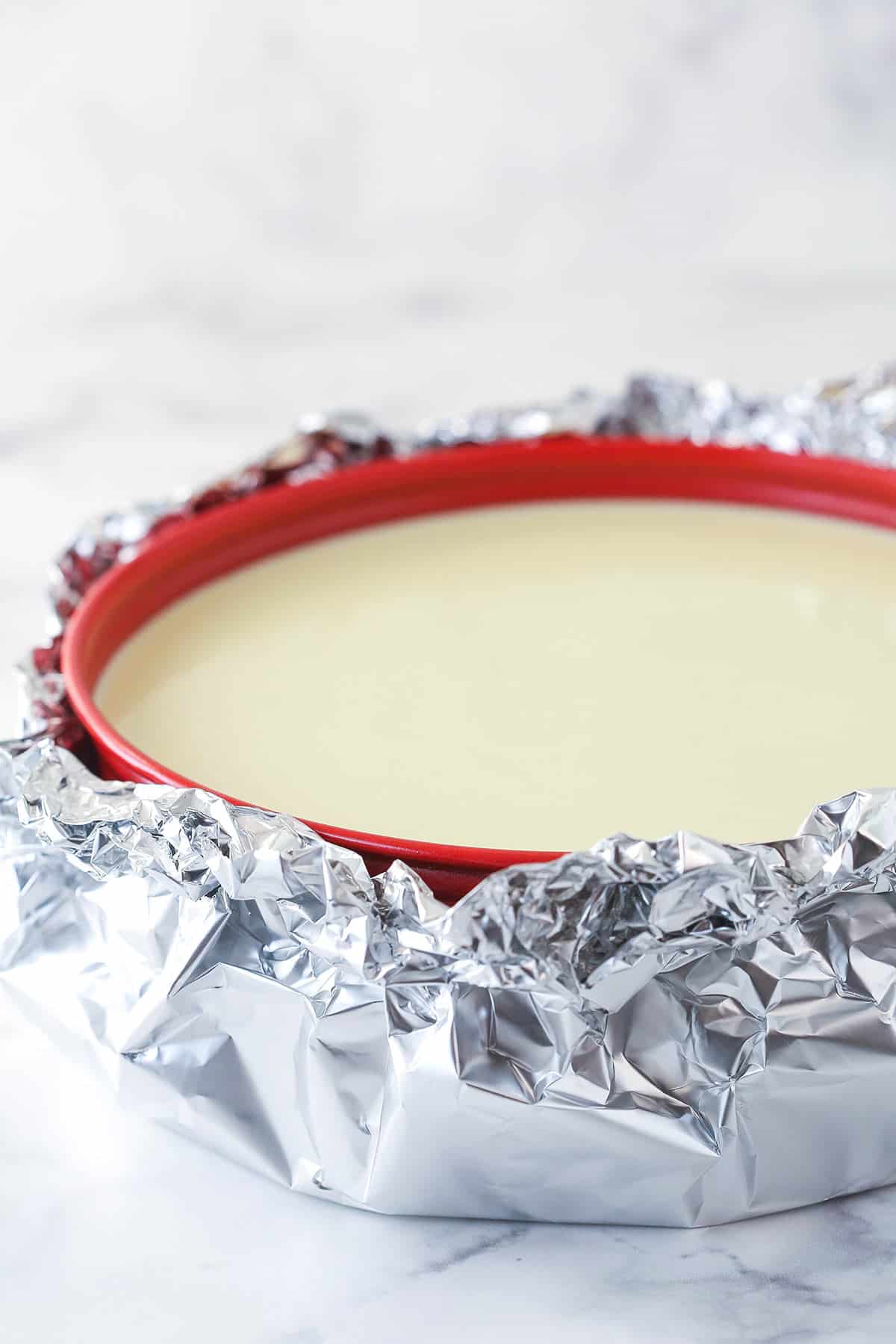
Set your foil-wrapped pan in your larger pan and fill the larger pan with hot water that comes about half way up the side of the springform pan. The water can boil a touch during baking, so you don’t want it to come up too high or the water could “jump” over the foil. Finally, bake your cheesecake according to your recipe.
Method 2: Slow Cooker Bags
I have been using this method for a long time. It was my original method for a leak-proof water bath and I’ve been doing this for years. Slow cooker bags can hold up to the heat and won’t form little holes or cracks, like aluminum foil. For this method, first wrap your springform pan in the slow cooker bag. The bag will be a little big, so tie a knot with the excess.
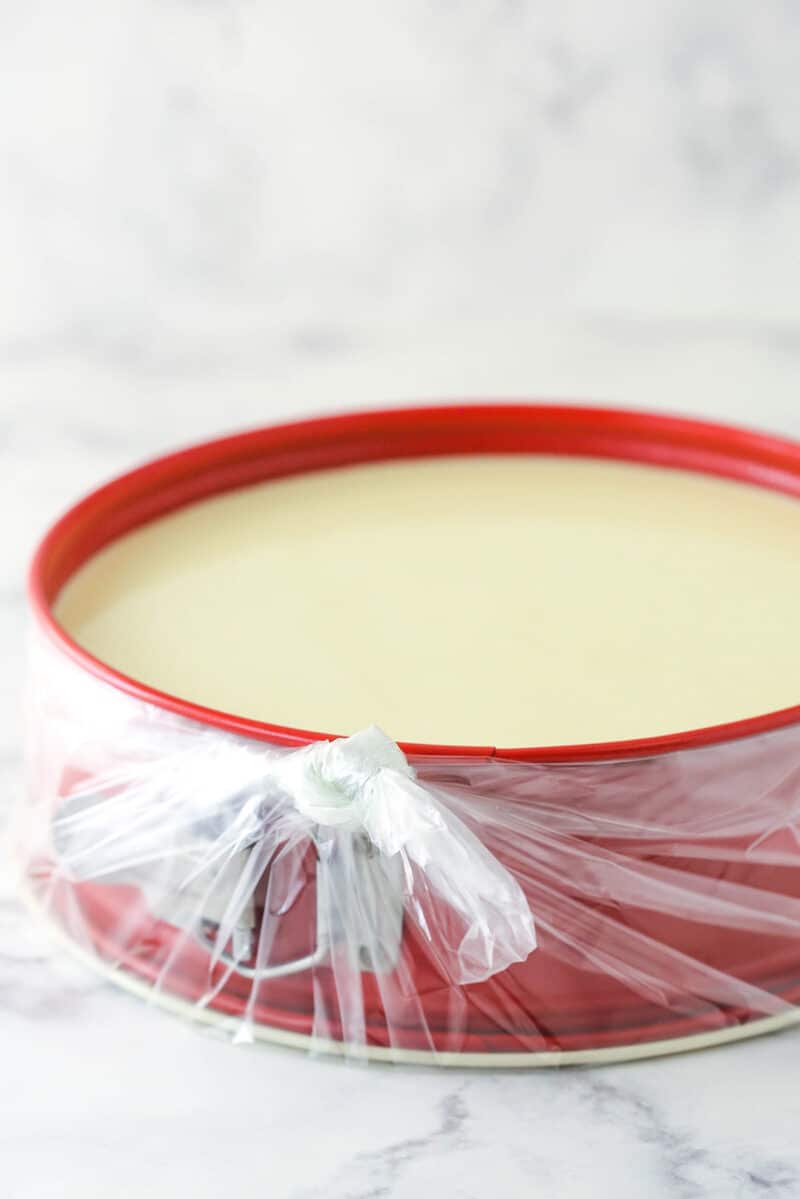
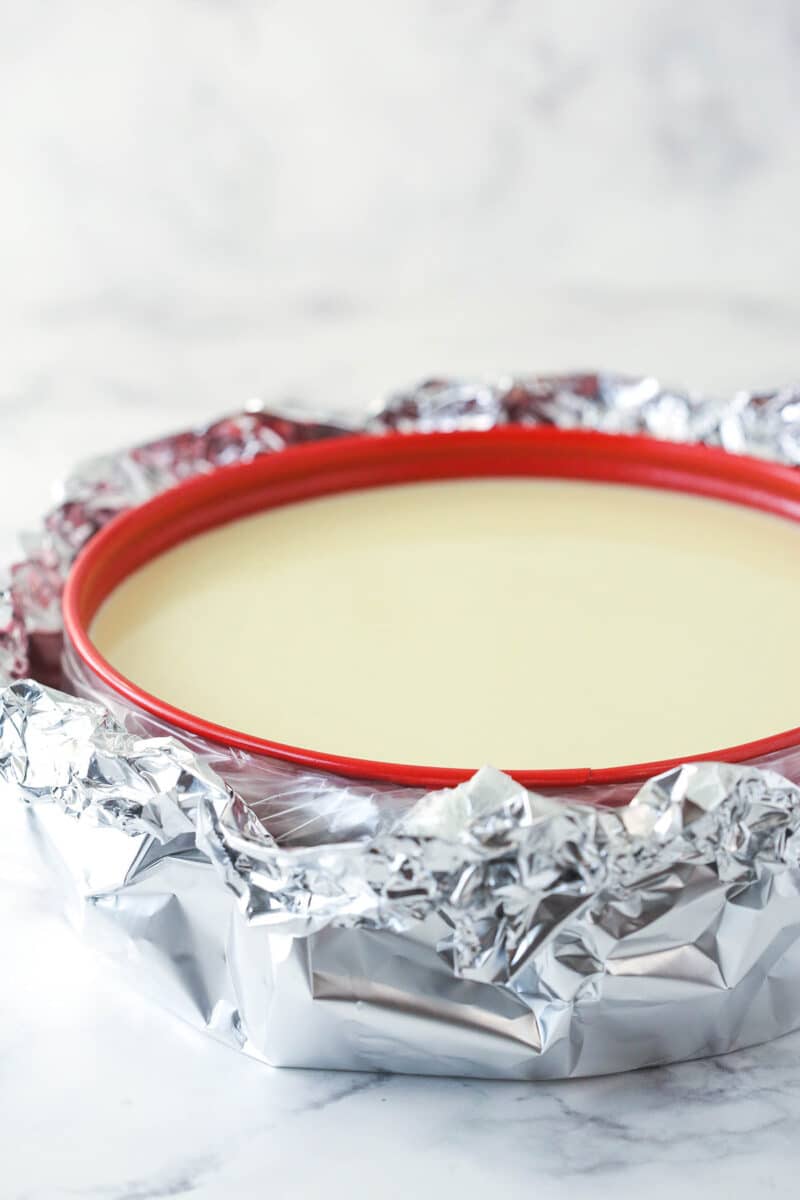
Wrap a layer of foil around the outside of the slow cooker bag, then place the pan in the larger pan. Fill the larger pan with hot water that comes about half way up the side of the springform pan, then bake your cheesecake.
Method 3: Silicone Pan
This is my most recent method. After getting a lot of questions about using a silicone pan in place of the slow cooker bag and foil, I decided to try it. I totally fell in love with this method! No need for wrapping and unwrapping, and no need to worry about leaking. Another plus is that the silicone pan is reusable so you won’t have to buy foil and bags over and over.
So for this method, just set your springform pan in the silicone pan. Place that into the larger pan that will hold the water, then add your hot water and bake. Just keep in mind that the water should only be about halfway up the sides of the silicone pan. You don’t want it to come up too high. The water could boil a touch while baking and you don’t want it to “jump” over the sides of the silicone pan and get into your crust.
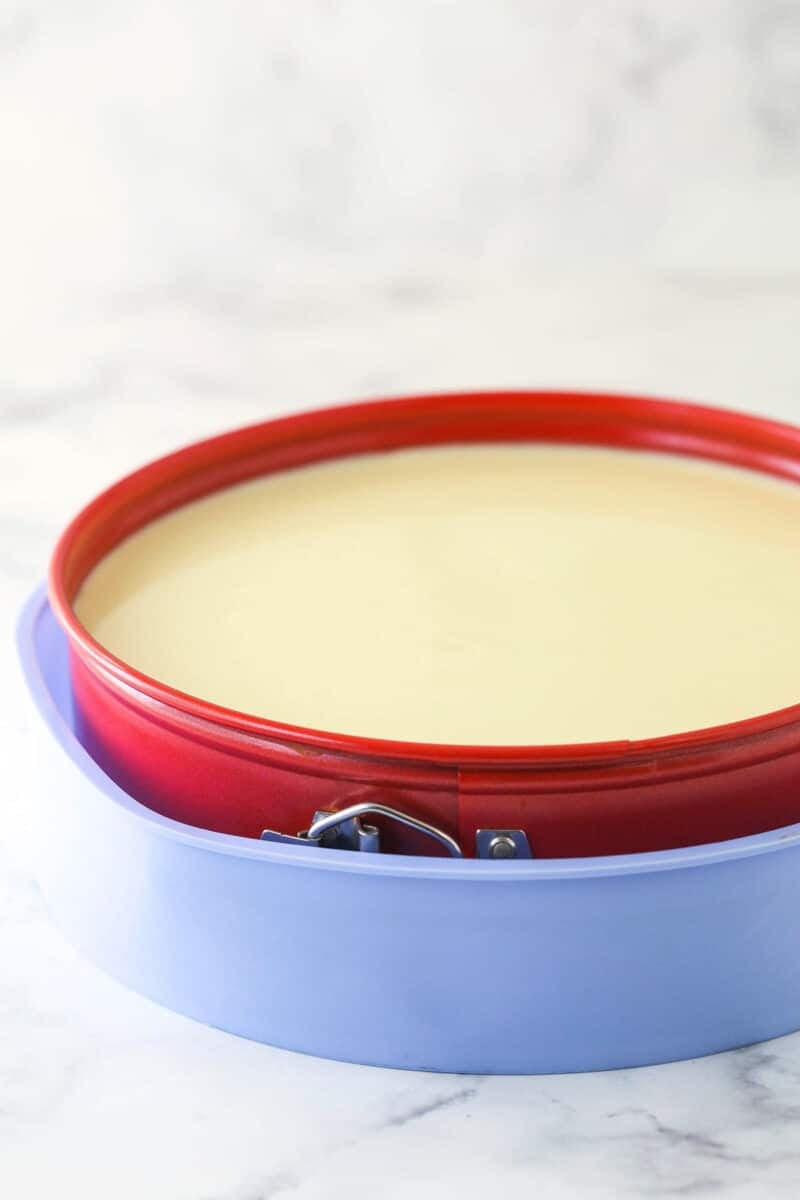
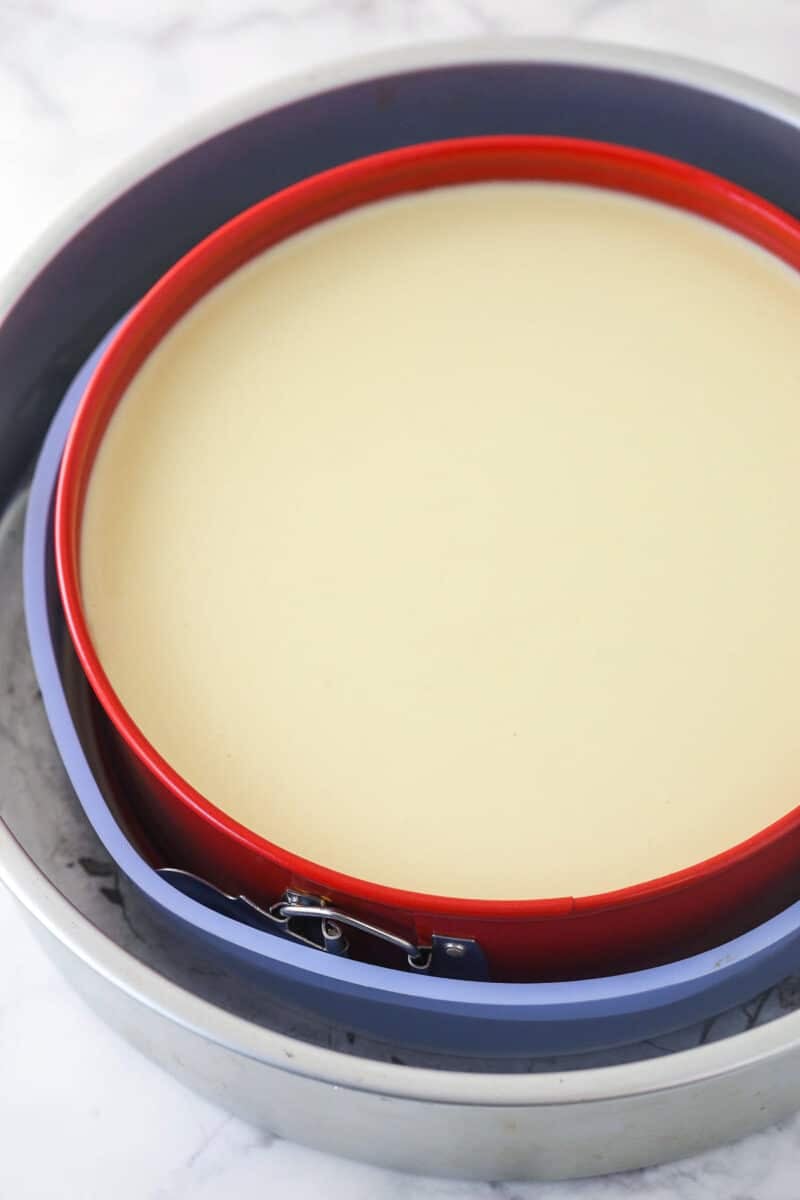
Compare: Cheesecake Baked With and Without a Water Bath
I’ve told you what happens when you bake a cheesecake without a water bath, and showed you how to set one up. Now let’s look at the final result with and without a water bath. Results could vary a bit between recipes (I used my Classic Vanilla Cheesecake), but this is generally what the difference looks like.
Cheesecake Baked with Water Bath
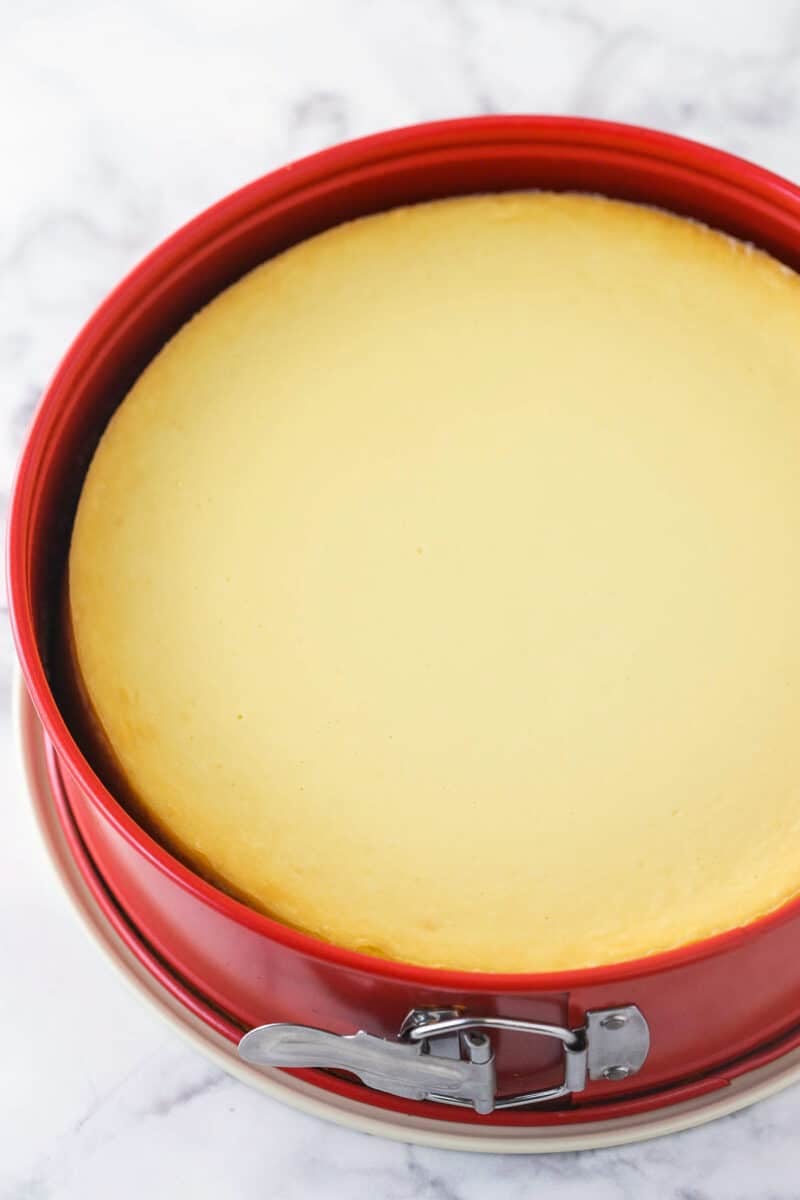
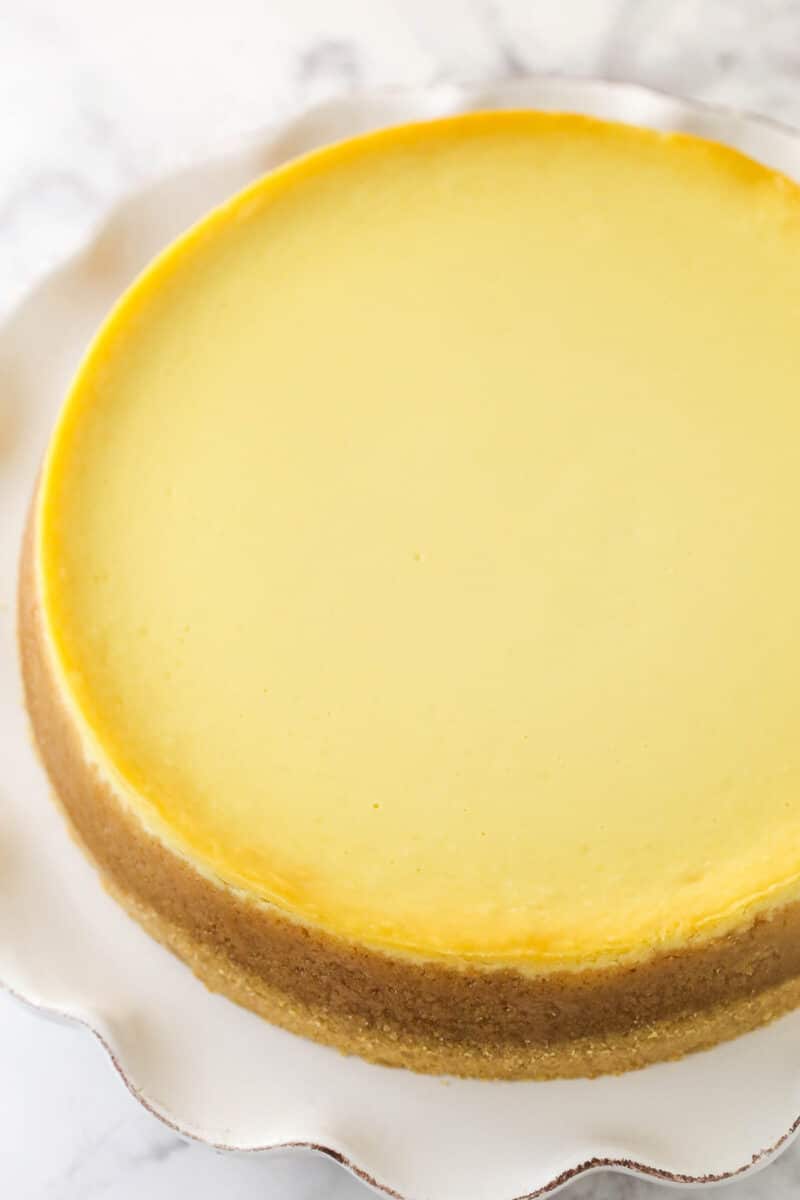
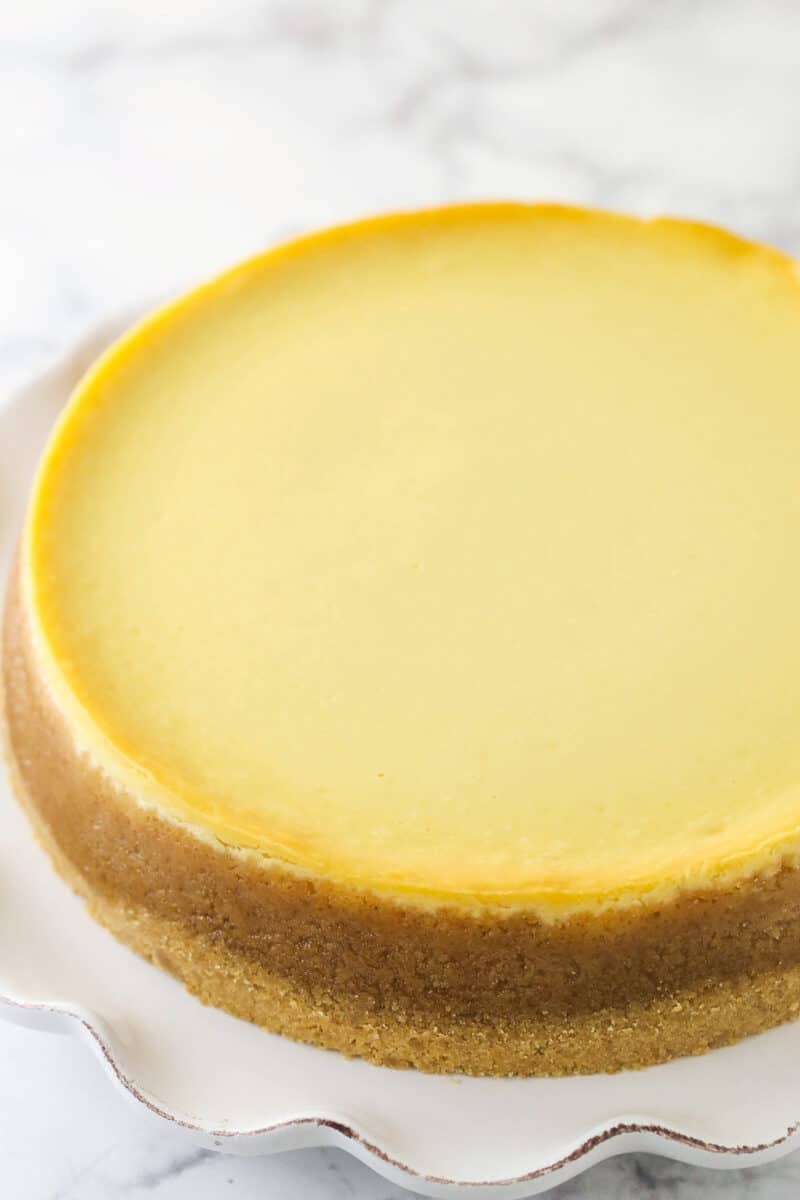
Cheesecake Baked Without Water Bath
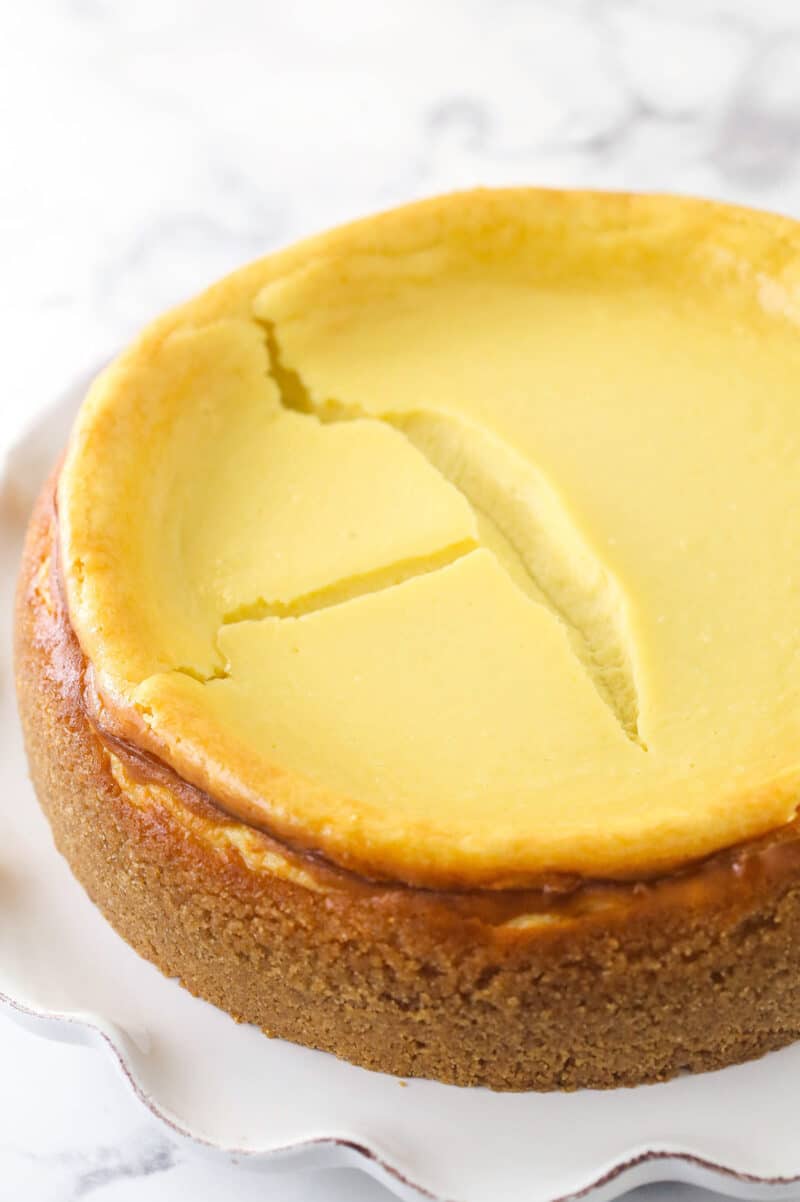
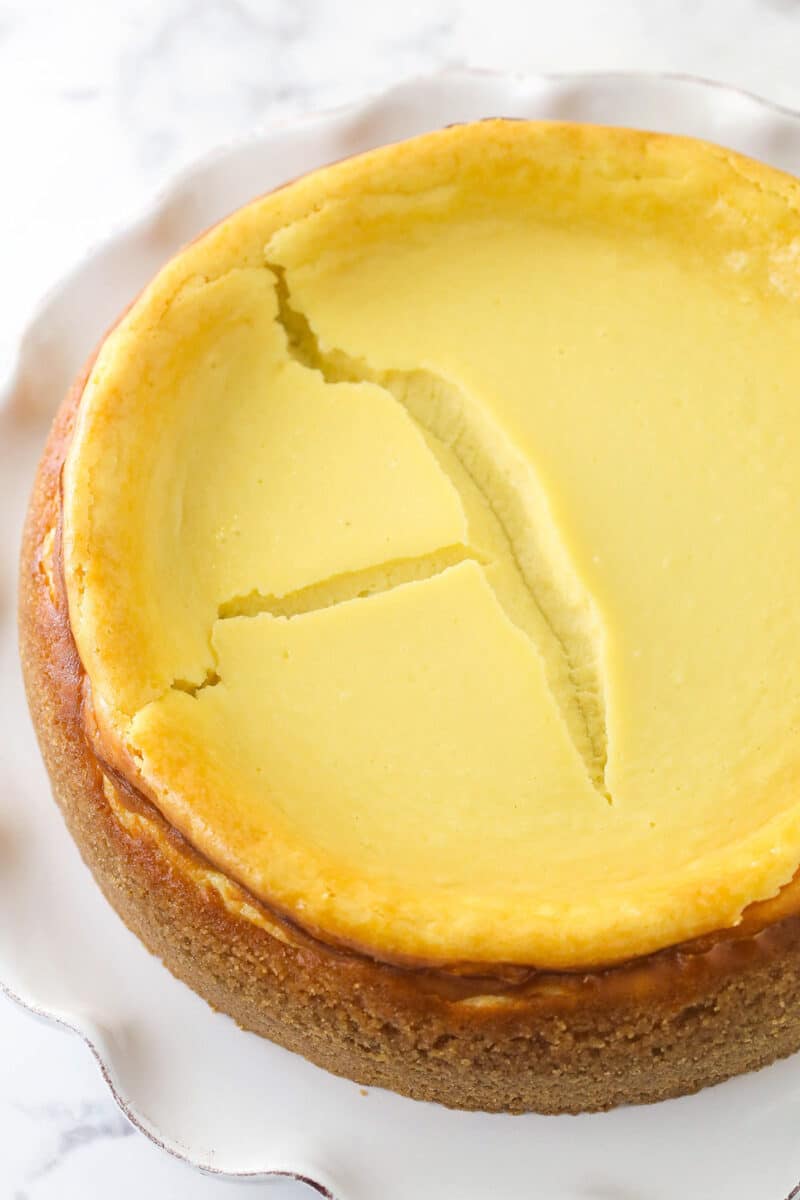
Can I Just Put A Pan Of Water On The Rack Below?
I get this question quite a lot, so I tested it. While your results may vary depending on the recipe, I found that the result was kind of in the middle. It still browned a little more than when you use a water bath and still fell a bit, which you can see in the sides, but otherwise it did well. It didn’t fall in the center and it didn’t crack. So if you’re really averse to using a water bath and don’t mind the slight imperfections, this would certainly be an option.
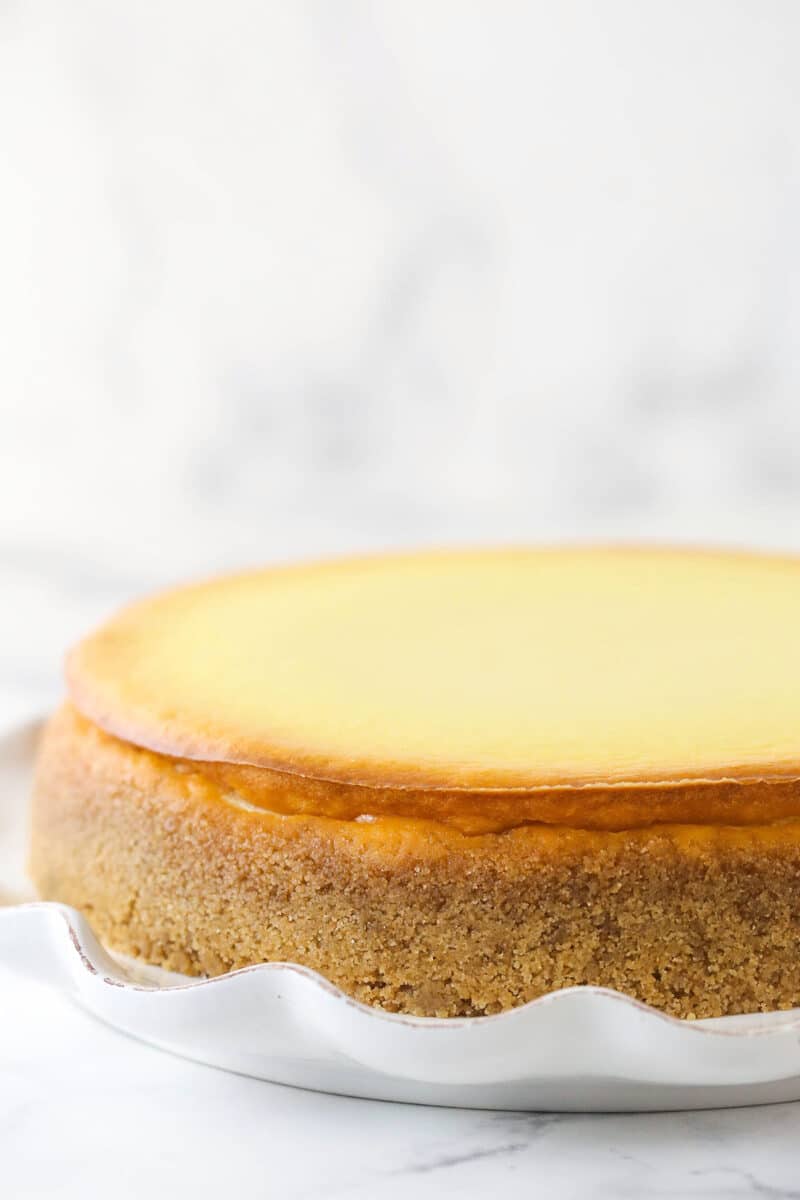
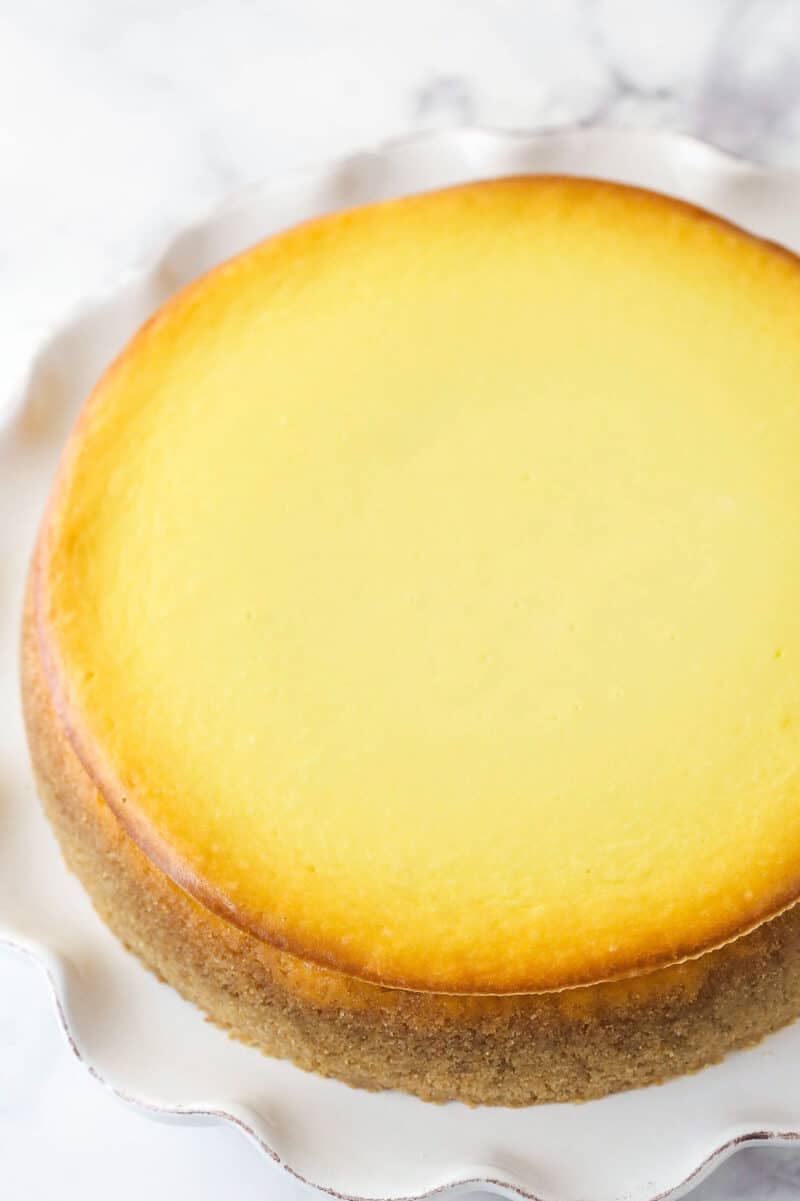
When do I NOT Need a Water Bath?
If you’re using a recipe that doesn’t call for one, then that should be fine. Mini cheesecakes also don’t require a water bath, nor do 9×13 cheesecakes. Their smaller and thinner size means they bake more evenly without having to use a water bath. And of course a no-bake cheesecake doesn’t need one either.
Pro Tips For a Great Cheesecake
- Don’t over or under bake your cheesecake. Check out my post on how to tell when your cheesecake is done baking.
- Add the water to your water bath pan with the pan near the oven. Trying to carry a heavy pan full of water and a cheesecake without it splashing around is not easy.
- Cool it slowly. All of my cheesecake recipes call for a two step cooling method that allows the cheesecake to bake fully while not over baking. It also helps to avoid cracking.
- Let your cheesecake chill and firm up before removing it from the springform pan. When you’re ready, check out my tutorial and video for how to remove a cheesecake from the springform pan.
- When you’re ready to store your cheesecake, check out my post on storing it, freezing it, etc.
- If you want to bake a cheesecake in a size other than a 9 inch pan, check out my guide to adjusting cheesecake sizes.
Now that you know how to do a cheesecake water bath, here are some amazing cheesecake recipes to try:
- Strawberry Cheesecake
- Best Oreo Cheesecake
- New York Style Cheesecake
- Dark Chocolate Cheesecake
- Turtle Cheesecake
- Cinnamon Roll Cheesecake
- Amaretto Cheesecake
- S’mores Cheesecake
- Mint Oreo Cheesecake
- Apple Cinnamon Cheesecake
- German Chocolate Cheesecake
- Red Velvet Cheesecake
- Caramel Apple Cheesecake
- Pumpkin Cheesecake
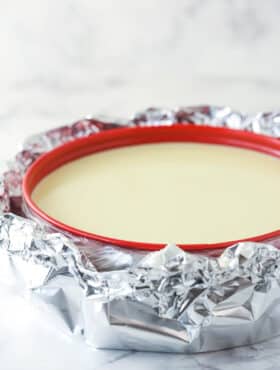
How to Bake Cheesecake in a Water Bath
- Prep Time: 45 minutes
- Cooling Time: 4 hours
- Cook Time: 2 hours 15 minutes
- Total Time: 7 hours
- Yield: 12-14 slices
- Category: Dessert
- Method: Oven
- Cuisine: American
Description
Let’s talk about how to make a water bath for a cheesecake! They aren’t hard to set up and the extra step will give you a beautiful, creamy cheesecake free of cracks! Plus, I’ll share with you my tricks for no leaks!
Ingredients
- Springform pan
- Aluminum foil, optional depending on method
- Slow cooker bags, optional depending on method
- Large silicone pan, optional depending on method
- Large pan (Like a roasting pan or a 12 inch cake pan)
Instructions
- Make your crust: The first thing you need to do for any cheesecake is properly prep your pan and add your crust. I typically use a graham cracker crust or Oreo crust. I typically pre-bake my crust a bit.
- Prep your pan for the water bath: After you bake your crust, you can go ahead and prep your pan for a water bath using one of the 3 methods discussed above. You can either: 1. Wrap your pan in two or three layers of aluminum foil, 2. Wrap you pan in a slow cooker bag and one layer of foil, or 3. Place your springform pan in a slightly larger silicone pan. Place your springform pan into the larger roasting pan or cake pan.
- Add cheesecake filling: Now you can make your cheesecake filling and add it to the crust.
- Add hot water: Bring your pan close to the oven so prevent moving a pan full of water all over the place, then add the hot water to the outer large pan.
- Bake cheesecake: Place your cheesecake and it’s water bath in the oven and bake as directed.
- Cool Cheesecake: When your cheesecake has baked, you can remove it from the water bath, but leave it in the springform pan. You can set the cheesecake on a cooling rack to cool to room temperature and then refrigerate it, or just place it straight in the fridge to cool completely. If you don’t want any condensation forming on top, let it cool to room temperature before refrigerating it.

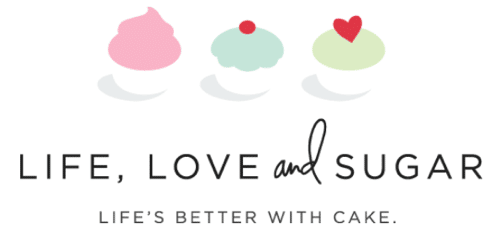
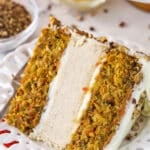
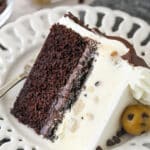


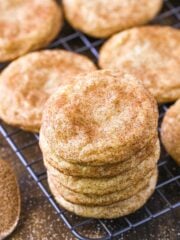
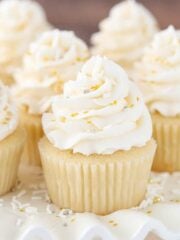
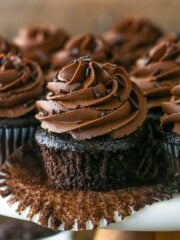

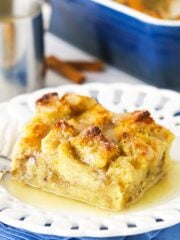
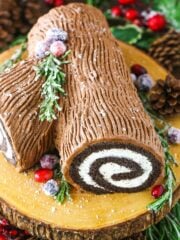
Lindsay, I do not how or what or who but finding these cheesecake recipes/+hacks/secrets. in my fb post was absolutely a Godsend (I think?). Hubby of 40 years whispered in ear, at church no less on Sunday, that a cheesecake sure sounded good. I can count on one hand how many cheesecakes I’ve made him. So I automatically went into full blown panic attack UNTIL I found your website. What can you recommend for just a plain Jane version of cheesecake–nothing uber fancy. Valentine’s is coming up and this is my gift to him. Hope I’m not starting something here but I know I am. Thanks
I’m glad you’re finding the site helpful! 🙂 I do love a good cheesecake. Here’s a vanilla cheesecake that is a great option. I used some vanilla bean in it, but you could just use vanilla extract if you want to keep it simple.
I am a huge fan of cheesecake- I even have Junior’s original cheesecake recipe, made it so many times, I know it by heart! I downloaded 300 cheesecake recipes from Ebay years ago, and have picked my favorites. I’m always looking for chocolate cheesecake recipes in particular. I had one years ago that called for almost 3 pounds of chocolate, and lost the recipe. Talk about decadent!
I will try yours for sure! I try to always keep Famous Chocolate wafers on hand. (Can anyone tell me why they NEVER go on sale??)
Love your blog! Keep up the great work!
I tried this out on New Years Eve afternoon while making a white chocolate raspberry swirl cheesecake and it worked perfectly and was so easy. Excellent tip!
I’m so glad it was helpful!
The oven bag trick did not work- tried today with your recipe of German chocolate cheesecake (for her birthday on Friday) – the water still went through the foil into the oven bags and through it 🙁
Perhaps there was a hole in the bag or the water was a little high and went over the top? Water wouldn’t go through the plastic, so it must’ve gotten around it somehow.
Hi Lindsay…I had the same problem. About 1/4 cup I’m guessing. I was really careful to the the plastic nice and tight. Even using binder clips to secure it. And heavy duty foil around that. Any ideas? Would love to hear back from you. Thanks.
There shouldn’t be any leaking through the bags, unless they have a hole for some reason. The only way for water to get in would be going over the top. Definitely make sure it’s securely in place and high enough on the sides of the pan for water to not get over the top.
Thank you for sharing this tip. I stopped doing the water baths because of the leaking.
How much water do you recommend pouring in between?
Would the size of the larger pan affect the cheesecake in any way?
Thank you.
I usually fill a little more than halfway up the side of the springform pan. A larger pan shouldn’t affect it.
I had the same problem with 2 cheese cakes today but got water in them…. It 1 in the morning and I them later today… Any other tips?? Can they collect water due to sweat?
I wouldn’t think they’d collect sweat, unless there’s already a little water in there.
Really nice ! Never thought of this ever. Appreciate it.
Genius!
OMG!! Prayers answered!! Definitely trying this next time. I have some of those bags now and am not using then. Wish I had this tip last night. Oh well….next time.
I hope it helps when you try it!
I make a lot of desserts (cakes & cheesecakes) for church bake sales. The week before the scheduled bake sale is too busy to get all baked I want to. I would like to make several but time limits dictate how many I can get done that guarantee freshness. Do your cakes/cheesecakes freeze well? Can you give me tips/suggestions?
I don’t personally do a lot of freezing. If you want to freeze layer cakes, I’d recommend freezing the layers, then building the cake before using. To freeze cake layers, I wrap then in clear wrap, then aluminum foil and defrost them in the fridge. Cheesecakes I have less experience freezing, but would likely use the same method.
I have been freezing cheesecakes for years. I always wrap with saran wrap than tinfoil and a freezer baggie. Even up to a month. If they need decorated with anything I do it before I serve them.
Thanks for this! This has always been a problem so what I do is chill the cheesecake and hope (cross my fingers) that the crust will dry enough in the fridge. I’ve never heard of those baggies before but you can bet they will be the first thing I will be looking for next grocery trip…
Yes, often leaving it in the fridge will help the crust dry out too. 🙂
I have found that when I do the water bath that I have alot and melted butter leaking from my crust. What could be causing this? Possibly putting too much butter in my crust??
If there is a lot of butter, I’d try reducing the amount of butter a bit.
I have always done 2 pieces of foil then the bag, but I still get wet crust from time to time so by putting the bag on 1st it will stop the water from getting in?
It should, yes. I’d say it works 99% of the time. Sometimes the bags even seem to have little holes though. I’ve used them in the crock pot and had them leak before too, so they aren’t always 100%. But most of the time, yes.
Straight GENUIS!!!
What a great hack……. maybe it’s time to make more cheesecake!
It’s always a great time for cheesecake. 😉
Thank you so much for sharing this tip. Where have you been all my life 🙂
I am using this great tip this year for my six Pumpkin Cheesecakes. The only thing different i am going to do Is after the crust is cooled I will add the bag and foil and THEN fill with cheesecake batter.
THANK YOU!
Awesome tip, thanks much! Now to find an excuse to try it 🙂
What an awesome idea!! I will definetely be trying the next time. Thanks for sharing Lindsay! 🙂
E quem não sabe inglês?
Meu caso.
Vou tentar fazer e depois conto.
Great idea! I’ve been making cheesecakes for years, but could never find a way to not make it leak. The last few times I just made cheesecake bars in a 9×13 so I wouldn’t have to deal with it. 😛
That is an awesome hack, Lindsay! Seriously, I never woulda thunk to use my excess baggage that way. 🙂 No leaky cheesecake means happy times!